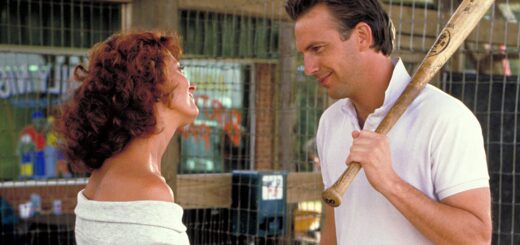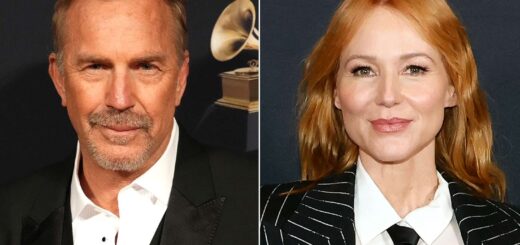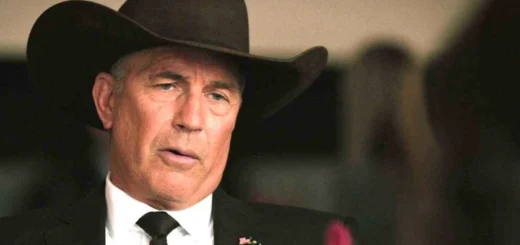“How Hollywood Lost Kevin Costner”
The Cowboy Unraveled: Kevin Costner’s Rough Ride Through Hollywood
On-set fights. Legal feuds. Box office disasters. What happened to America’s favorite cowboy?
It all started, as many conflicts do, over a simple conversation at a table.
They were filming in Utah — Kevin Costner, Wes Bentley, and Kelly Reilly — deep into another emotionally charged scene for Yellowstone. The tension wasn’t just in the script. Between takes, things took a turn. Sources say Costner, both the star and an executive producer on the hit series, began pressuring Bentley to ignore Taylor Sheridan’s script and act out the moment his way. Bentley refused. Firmly.
“I signed up for a Taylor Sheridan show, not a Kevin Costner movie,” he reportedly told Costner.
That didn’t sit well. “Kevin lunged at him,” says someone who was there. “No punches thrown, but it got physical — shouting, pushing, way too close. They had to be pulled apart.” Reilly, witnesses say, was left in tears. Filming paused.
For Yellowstone, it was a major blow. But for Costner, it was just another chapter in a long pattern of power plays, lawsuits, fractured partnerships, and a growing reputation for being impossible to work with.
There’s now a long list of former collaborators who quietly vow never to team up with him again. And they each have stories. Allegedly late payments — including one lawsuit over unpaid costume bills. Burned bridges — such as suing his own longtime producing partner for $15 million. Ignored advice — even when it came from legends like Steven Spielberg. And a habit of rewriting scripts, overruling directors, and feuding with co-stars — including Clint Eastwood, Kurt Russell, and now Bentley.
So the industry whispers have turned into open questions: What’s going on with Kevin Costner?
At 70, Costner still carries that iconic Americana appeal — the voice behind “If you build it, they will come”, the lead in The Bodyguard, the director of a film that won Best Picture. For decades, he seemed untouchable. But lately, it seems the man who once saved the Western is now barely staying in the saddle.
From A-list blockbusters to backstage chaos, his story now includes speaking gigs at bakery expos and veterinary conventions — a stark contrast to the roaring stadiums he once commanded.
“It’s just sad,” says one longtime associate. “He got lost. Something changed. And I don’t think even he knows what happened.”
The Rise: From Underdog to Hollywood Hero
When Dances With Wolves began production, most in the industry expected a disaster. A Western — then considered financial poison — led by a first-time director who was also producing and starring? The skeptics even nicknamed it “Kevin’s Gate,” mocking the infamous flop Heaven’s Gate.
But Costner defied every prediction. He raised the film’s $22 million budget largely outside the studio system, contributing $2.5 million of his own money. The result: a $424 million global success and seven Academy Awards, including Best Picture and Best Director. Costner became a household name.
Suddenly, he could do no wrong. Robin Hood: Prince of Thieves earned $390 million. JFK grossed over $200 million. The Bodyguard raked in $411 million and gave the world Whitney Houston’s legendary cover of “I Will Always Love You.”
Costner was riding high. For a time, he sat comfortably beside Cruise, Schwarzenegger, and Willis atop Hollywood’s A-list.
The Fall: Big Budgets, Bigger Problems
Then came Waterworld — a post-apocalyptic epic that Spielberg had warned him not to shoot on open water. Costner didn’t listen.
Shot off the coast of Hawaii, the production faced storm delays, accidents, jellyfish stings, and even a near-death experience for Costner himself, who was stranded atop a mast when his safety line snapped.
The film ballooned to a then-unprecedented $175 million budget and opened to disappointing box office and critical scorn. Costner’s reputation took a hit. But he doubled down.
Two years later, The Postman — another expensive dystopian tale that he directed, produced, and starred in — bombed even harder. It didn’t help that it released the same day as Titanic.
Though these films didn’t kill his career, they changed it. The studios no longer handed him blank checks. The creative freedom he once enjoyed was now under scrutiny.
He kept working — in Draft Day, The Guardian, Thirteen Days, and Swing Vote. He directed again with Open Range, a modest Western that did well with critics. But the golden glow was fading.
The Reputation: Creative Control at a Cost
Behind the scenes, the stories piled up. On A Perfect World, he reportedly clashed with Eastwood over creative differences. On 3000 Miles to Graceland, things grew tense with Kurt Russell.
Even longtime allies didn’t escape unscathed. Jim Wilson, his producing partner on films like Wyatt Earp and Message in a Bottle, was eventually sued by Costner for $15 million.
Rick Nicita, a former agent who represented Costner in the 2000s, offers a more diplomatic view.
“‘Difficult’ can mean a lot of things,” Nicita says. “He wasn’t lazy. He wasn’t rude. He showed up and knew what he wanted. But if he didn’t get it, he wasn’t one to compromise. Some saw that as confidence. Others saw arrogance.”
And now? The whisper networks in Hollywood are louder than ever. Behind the accolades, the fame, and the cowboy persona is a man seemingly at odds with the very industry that once adored him.
Whether he finds redemption or rides off into a more obscure sunset remains to be seen. But one thing’s clear: somewhere along the trail, Kevin Costner lost Hollywood — or maybe Hollywood lost him.


